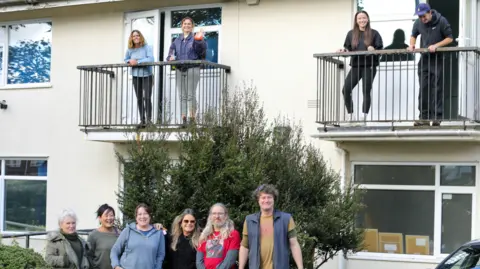In recent weeks, various overseas Chinese communities have implemented a series of healthcare initiatives aimed at serving expatr
In recent weeks, various overseas Chinese communities have implemented a series of healthcare initiatives aimed at serving expatriates. These efforts include the establishment of health service centers, the launch of online consultation platforms, and medical teams providing home visits, all designed to deliver comprehensive medical services to overseas Chinese citizens.
“I used to have to take my family members to big hospitals in other cities, but now everything can be resolved right in our hometown,” said Ms. Chen, an expatriate from Qingtian, who recently returned from Spain to accompany her mother through a successful total knee replacement surgery at the Qingtian County People’s Hospital. Ms. Chen’s mother had been suffering from knee issues, and due to the family’s long-term overseas residency, they were unable to assist her in seeking timely medical care. The local expatriate health service center had invited specialists from Shanghai to perform the surgery, sparing the family from unnecessary travel.
In addition to outpatient services, hospital admissions, and health checkups, the Qingtian County health center has also launched an online consultation platform to provide medical advice and medication suggestions to overseas expatriates. This past July, Qingtian County People’s Hospital’s “Health Manager” program began collaborating with ten overseas Chinese associations, assigning a doctor and contact person to each association. Zhou Jianhong, president of the Qingtian Association in Barcelona, shared in an interview: “With over 50,000 Qingtian expatriates in Barcelona, the ‘Health Manager’ program allows us to receive timely and professional remote medical services.”
In Jiangmen, Guangdong, the Jiangmen Federation of Returned Overseas Chinese, in partnership with local hospitals, has established the “Health Service Center for Expats.” This center offers a green channel for medical visits, health check-ups, online consultations, and wellness seminars. For underprivileged returnees and their families, the center also provides discounts or waivers on certain medical fees.
Zheng Haiyan, deputy president of the Venezuelan newspaper “Wiguo Chinese Post” and a native of Enping City in Jiangmen, expressed, “The health service center allows us to better understand our health status and facilitates early detection and treatment of diseases. The online consultation service makes it easy for us to communicate with doctors and receive professional medical advice while overseas.”
Ms. Wang, an expatriate in Japan, shared her experience, saying, “After acupuncture treatment, my headaches have significantly improved. I’m thankful for the traditional Chinese medicine team that came to provide free consultations.” Wang has struggled with sleep issues, often suffering from dizziness and headaches. During a recent free clinic event, part of the “Caring for Overseas Chinese” initiative, she experienced the benefits of traditional Chinese medicine.
From late September, a Chinese medicine team formed by the Anhui Federation of Returned Overseas Chinese, together with Anhui University of Traditional Chinese Medicine and its affiliated hospitals, organized five health lectures and seven health services in Japan and Korea. Wherever they went, the Chinese medicine experts provided consultations for expatriates, sharing knowledge on traditional wellness practices. In Korea, the team offered free consultations in the Chinese community of Anyang, where local expatriates appreciated the doctors’ patience, professionalism, and detailed explanations.
“Is there a way in traditional medicine to control blood sugar?” and “What can I do about persistent eczema?”—queries raised by Malaysian expatriates during the recent “Tianfu Cloud Medical·Rongqiao Health” event, where they connected with doctors from Chengdu’s Integrated Traditional Chinese and Western Medicine Hospital through video calls. Since its establishment last year, the remote medical service station has hosted eight consultation events, catering to overseas expatriates.
Local communities are also inviting expert doctors to engage in free clinics and offering support. In Kunming, Yunnan, the first volunteer medical service team consisting of healthcare professionals and representatives from the expatriate community has been formed to conduct health checks and distribute commonly used medications. Similarly, the Jiangsu Federation of Returned Overseas Chinese collaborated in July with the Jiangsu Provincial Administration of Traditional Chinese Medicine and Nanjing University of Traditional Chinese Medicine to launch the “Jiangsu Traditional Chinese Medicine Benefit Program,” resulting in numerous wellness events across cities like Changzhou and Taizhou. The Hainan Federation of Returned Overseas Chinese has established a special fund for major illness relief, aiming to support grassroots expatriate populations effectively.
As services targeting expatriates continue to improve, the first overseas health tourism center was inaugurated in September in Quanzhou, Fujian. This center integrates traditional Chinese medical services with cultural and tourism resources, offering diverse experiences tailored for expatriates.
Shu Shaotang, a committee member of the Philippine Federation of Chinese Associations and one of the first visitors, shared, “At the health tourism center, we experienced a blend of traditional Chinese medicine and modern technology in health services, enjoying a rejuvenating time for both body and mind. The continuous rollout of initiatives based on the needs of expatriates has made us feel both secure and cared for.”
 Interim SpacesThe new Commercial Road Studios can be used by artists from Shepton MalletAn empty Somerset office block that was once a registry office has been turned into studios for 15 artists run by a charity.
Interim SpacesThe new Commercial Road Studios can be used by artists from Shepton MalletAn empty Somerset office block that was once a registry office has been turned into studios for 15 artists run by a charity.